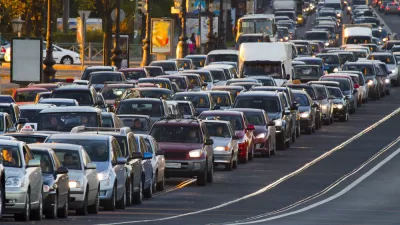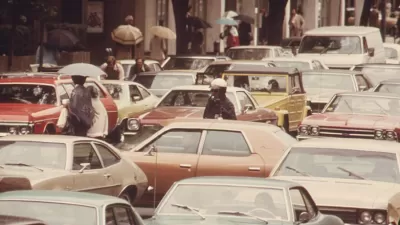Is there a relationship between carless households and density of college graduates? Derek Thompson of The Atlantic connected the dots using Michael Sivak's latest 'peak car' study and saw a relationship between the two variables.

"The members of the The Atlantic Business Channel (where Derek Thompson works as a senior editor) all live in New York City. At various points in our lives, we have all lived in Washington, D.C., too. And these two cities...happen to be the two metros with the highest share of non-car households in America, according to the University of Michigan’s Transportation Research Institute," writes Thompson.
When Thompson looked at the graph (located in the article) of the 30 cities showing which metros have the highest and lowest rates of "non-car households" (as well as the U.S. average), the first thing he thought of was not what the researcher told The Wall Street Journal:
The five cities with the highest proportions of households without a vehicle were all among the top five cities in a recent ranking of the quality of public transportation," said Michael Sivak, director of Sustainable Worldwide Transportation at Michigan.
"When I see New York, D.C., Boston, Philadelphia, San Francisco [the top-five, respectively, no-car households], the first thing I think is: These are all the classic, even cliche, magnets for elite college graduates," he wrote.
So I compared the cities' non-car ownership rates to their share of bachelor's-degree holders. And it turns out there is a statistically significant relationship between being college-dense and car-light. [Scroll across the interactive dot graph (under the aforementioned graph in article) that reveals "% no-car, % college"]
Thompson recognizes that "what we're looking at here is an underlying variable of city density. Highly productive cities that are magnets for talented (and rich) people tend to be crowded with twentysomethings trying to start their careers. Small crowded cities get clogged, and clogged cities require the kind of effective public transportation that makes cars an expensive nice-to-have rather than a have-to-have," he writes.
The theory doesn't appear to hold, though, for Austin and San Jose, the major city of Silicon Valley, ranked third-to-last and last, respectively, in the ranking of carless households.
Sivak's report, "Has Motorization in the U.S. Peaked? Part 4: Households without a Light-Duty Vehicle" [PDF] was discussed here and also in USA Today.
FULL STORY: Why Do the Smartest Cities Have the Smallest Share of Cars?

Planetizen Federal Action Tracker
A weekly monitor of how Trump’s orders and actions are impacting planners and planning in America.

Restaurant Patios Were a Pandemic Win — Why Were They so Hard to Keep?
Social distancing requirements and changes in travel patterns prompted cities to pilot new uses for street and sidewalk space. Then it got complicated.

Map: Where Senate Republicans Want to Sell Your Public Lands
For public land advocates, the Senate Republicans’ proposal to sell millions of acres of public land in the West is “the biggest fight of their careers.”

Maui's Vacation Rental Debate Turns Ugly
Verbal attacks, misinformation campaigns and fistfights plague a high-stakes debate to convert thousands of vacation rentals into long-term housing.

San Francisco Suspends Traffic Calming Amidst Record Deaths
Citing “a challenging fiscal landscape,” the city will cease the program on the heels of 42 traffic deaths, including 24 pedestrians.

California Homeless Arrests, Citations Spike After Ruling
An investigation reveals that anti-homeless actions increased up to 500% after Grants Pass v. Johnson — even in cities claiming no policy change.
Urban Design for Planners 1: Software Tools
This six-course series explores essential urban design concepts using open source software and equips planners with the tools they need to participate fully in the urban design process.
Planning for Universal Design
Learn the tools for implementing Universal Design in planning regulations.
Heyer Gruel & Associates PA
JM Goldson LLC
Custer County Colorado
City of Camden Redevelopment Agency
City of Astoria
Transportation Research & Education Center (TREC) at Portland State University
Camden Redevelopment Agency
City of Claremont
Municipality of Princeton (NJ)




























